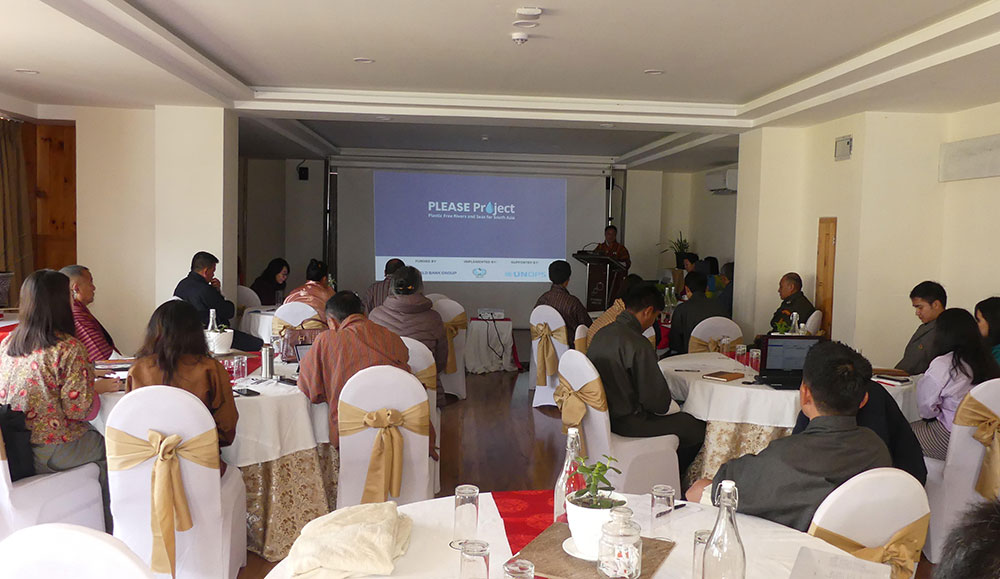YK Poudel
Wangchhu in Thimphu has been getting dirty and not very nice for some time now. But now, a project has started to make it clean and flowing nicely again.
Many different groups and ideas are working together on this project. They want to make sure the river looks better and also to cut down on how much plastic waste is made.
Conceptualised by Gross International Nature (GIN), a youth-led organisation, the project is led by Bhutan Ecological Society (BES). The BES, GIN and Clean Bhutan (CB) have teamed up for a project called “Reimagining effective partnerships for tackling plastic waste and river pollution.”
The project started coinciding with the Global Recycling Day.
During the meeting that started yesterday, Dasho Paljor J. Dorji, who is a Board Member of BES and a Special Advisor to the government, emphasised the importance of working together towards a shared goal.
He highlighted the aim of having a free-flowing river in Bhutan, emphasizing that clean water plays a crucial role in enhancing the aquatic ecosystem. He also stressed the need for future projects focused on managing river systems.
Sonam Wangchuk, the chief environment officer at Thimphu Thromde, recognized the urgency of addressing the daily waste production, which amounts to 54 metric tonnes.
He expressed concern that despite the nation’s ambitious pledge to reduce waste production by 80 percent by 2030, the current pace of initiatives suggests that this promise may not be met.
Furthermore, he emphasised the importance of collaborative efforts from every individual.
“Every person needs to change their mindset about waste—keep an eye on how much waste you produce, or all the efforts won’t be enough to achieve our goals,” he said.
He also said that receiving external assistance serves as motivation for Bhutan to increase its efforts in waste management, which has been a longstanding challenge.
In Thimphu, the amount of waste disposed of at the landfill increased by approximately 4,800 metric tonnes in 2021 compared to 2019. In 2019, about 14,824.8 metric tonnes of waste were disposed of.
The project initiated by BES aims to raise awareness and build skills within specific communities, introduce creative and local solutions through partnerships, and improve national and regional expertise through learning.
Additionally, it seeks to increase the involvement of women in project management and oversight.
Sonam Wangmo, the Project Lead of BES, stated that the project’s main focus would be on managing plastic waste at the household level and organizing river cleanup campaigns involving youth and women.
“Additionally, we will establish a recycling hub to process recyclable materials, create useful products like bricks and pellets from recycled materials. Furthermore, we plan to install 20 filtration systems and provide waste bins and storage facilities,” Sonam Wangmo said.
She highlighted that the project has the potential to reduce the need for imported bricks and pellets, aligning with the goal of reducing plastic waste.
The project aims to involve over 1,500 beneficiaries, with a commitment to ensuring that at least 50 percent of participants come from marginalised sectors of society, including youth and women from different areas.
The project focuses on eight specific communities: Taba, Jungshina, Royal Body Guard, Dechencholing HSS, Kawang Gewog, Kuzugchen MSS, Tango, and Dordena Buddhist College and Pangrizampa.
The project is scheduled to conclude in January 2025.
A crucial aspect of the project involves setting up a recycling hub equipped with advanced technology to process different types of plastic waste, such as High-Density Polyethylene (HDPE), Polypropylene (PP), and Polyethylene Terephthalate (PET), into eco-friendly bricks (UR bricks) and reusable pellets.
The project has the potential to divert approximately 422 tonnes of plastic waste from entering the landfill. This diversion is expected to help eliminate around 1,266 tonnes of CO2 emissions annually.
At the beginning, Thimphu Thromde, the Dzongkhag, Global Shapers, Bhutan Toilet Organization, and Tashi Beverages will be involved in implementing the project.
This initiative is made possible through the Plastic Free Rivers and Seas for South Asia grant, which is a project worth a total of US Dollar 1.04 million funded by the World Bank.
The implementation will be overseen by the South Asia Cooperative Environment Programme, with support from the United Nations Office for Project Services.


